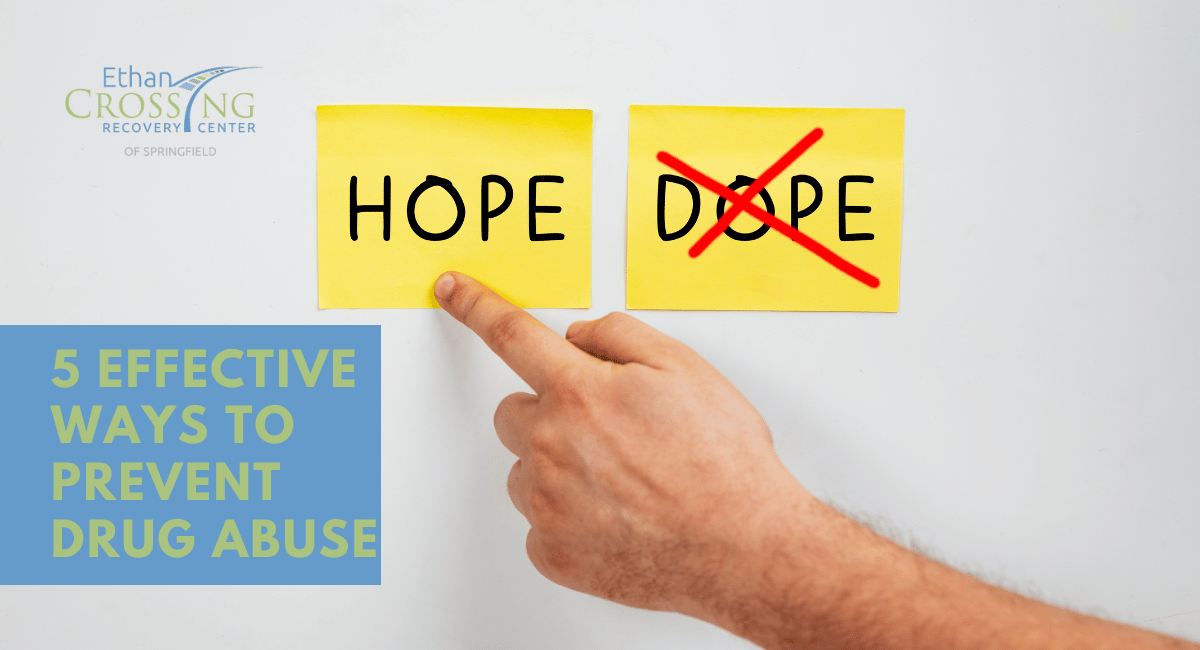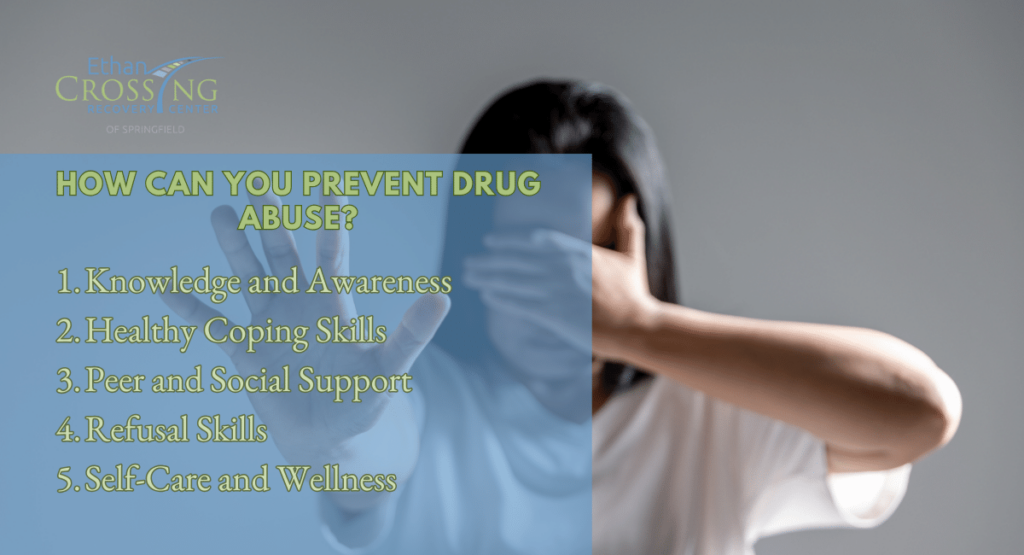Drug abuse is a pressing concern that affects individuals, families, and communities worldwide. Its impact can be devastating, leading to physical and mental health problems, strained relationships, legal issues, and a decline in overall well-being. Recognizing the importance of drug abuse prevention is crucial in addressing this widespread issue and promoting healthier and happier lives for individuals and society as a whole.
The prevalence of drug abuse, particularly among teenagers and young adults, highlights the urgent need for effective prevention strategies. Studies consistently indicate that early intervention and prevention efforts significantly reduce the likelihood of substance abuse and its associated consequences. By focusing on prevention, we have the opportunity to stop the cycle of addiction, protect vulnerable populations, and create supportive environments that foster resilience and healthy choices.
This article will explore five effective ways to prevent drug abuse. These strategies are rooted in evidence-based research and have proven successful in empowering individuals to resist the allure of drugs, build resilience, and lead fulfilling lives.
Table of Contents
What is Drug Abuse?
Drug abuse refers to the habitual or excessive use of drugs, either illicit substances or prescription medications, in a manner that is harmful to the individual’s physical and mental health, as well as their social functioning. It involves the misuse or overuse of drugs beyond their intended purposes or in ways that are not medically prescribed.
Drug abuse can manifest in different forms, including:
1. Illicit drug abuse
This involves the use of illegal substances such as cocaine, heroin, methamphetamine, marijuana, or hallucinogens. Illicit drug abuse is often associated with a range of legal and social consequences.
2. Prescription drug abuse
This refers to the misuse or excessive use of prescription medications, such as opioids (e.g., oxycodone, hydrocodone), benzodiazepines (e.g., Xanax, Valium), or stimulants (e.g., Adderall, Ritalin). Prescription drug abuse can occur when individuals use these medications without a legitimate medical need, take them in higher doses than prescribed, or use them in ways other than intended (e.g., crushing and snorting pills).
Drug abuse has negative consequences for individuals and society, including health problems (physical and mental), impaired functioning, legal and financial issues, social and interpersonal problems, and the risk of overdose and death. Factors such as genetics, environment, mental health, and social pressures contribute to drug abuse. Treatment and prevention efforts aim to address these factors and promote healthier, drug-free lives.
How Common is Drug Abuse?
Drug abuse is a significant public health concern that affects many individuals and communities worldwide. The prevalence and patterns of drug abuse can vary across countries, regions, and demographics.
According to the World Drug Report 2021 by the United Nations Office on Drugs and Crime (UNODC), an estimated 275 million people (or roughly 5.5% of the global population aged 15-64) used drugs at least once in 2020. It’s important to note that this includes both illicit drugs and the non-medical use of prescription medications.
Commonly abused substances include cannabis, opioids (such as heroin and prescription painkillers), cocaine, amphetamines, and hallucinogens. The rates of abuse can fluctuate over time and across different populations and is common among teenagers.
The misuse of prescription medications is a growing concern among teenagers. According to the 2020 Monitoring the Future study conducted by the UNODC, about 3.1% of 12th graders in the United States reported non-medical use of prescription opioids in the past year. Non-medical use of stimulants, such as those used to treat attention deficit hyperactivity disorder (ADHD), was reported by 4.9% of 12th graders.
It’s important to note that drug abuse is not always easily observable or reported. Many individuals may struggle with drug abuse in secrecy, making it challenging to determine the precise prevalence rates. Underreporting, stigma, and the hidden nature of certain substances can contribute to the complexity of accurately measuring the extent of drug abuse.
What is Drug Abuse Prevention and Control?
According to Wikipedia, Substance abuse prevention, alternatively referred to as drug abuse prevention, encompasses a range of strategies and initiatives aimed at thwarting the initiation of substance use and mitigating the emergence of issues related to the consumption of psychoactive substances. These preventive endeavors can be directed towards the individual directly or their immediate environment.
How Can You Prevent Drug Abuse?
Below are five important and effective strategies for preventing drug abuse for yourself or a loved one, especially teenagers and young adults:
1. Knowledge and Awareness
Educate yourself about the risks and consequences of drug abuse. Stay informed about the harmful effects of different substances, their addictive properties, and their potential impact on physical and mental health. Understand the signs of drug abuse and addiction, both in yourself and others, to recognize and address potential problems early on.
2. Healthy Coping Skills
Develop healthy coping mechanisms to deal with stress, emotional challenges, and life’s ups and downs without turning to drugs. Find constructive outlets for stress and emotions, such as exercise, hobbies, creative pursuits, or talking to trusted friends or family members. Learn and practice effective stress management techniques like deep breathing, mindfulness, or meditation.
3. Peer and Social Support
Surround yourself with positive influences and supportive relationships. Choose friends who share your values and encourage healthy behaviors. It’s important to cultivate friendships that don’t revolve around substance use. Engage in activities and communities that promote a drug-free lifestyle, such as sports teams, clubs, or volunteer organizations.
4. Refusal Skills
Learn and practice assertive communication and refusal skills to resist pressure to use drugs. Be prepared to say “no” confidently and assertively when faced with offers or situations involving drugs. Plan ahead and come up with alternative activities or responses to peer pressure that align with your values and goals.
5. Self-Care and Wellness
Take care of your physical and mental well-being. Maintain a healthy lifestyle by getting regular exercise, eating a balanced diet, and getting enough sleep. Manage stress through self-care activities that bring you joy and relaxation. Prioritize your mental health by seeking support when needed and practicing self-compassion.
Remember, preventing drug abuse is a personal responsibility, and individuals can take proactive steps to protect themselves. By building knowledge, developing healthy coping skills, surrounding yourself with positive influences, being assertive, and prioritizing self-care, you can significantly reduce the likelihood of engaging in drug abuse and promote a healthier, drug-free life.
Can a Healthy Sleep Routine Help to Prevent Drug Abuse?
Yes, getting enough sleep can play a crucial role in preventing drug abuse. Quality sleep is essential for overall health, and it contributes to various factors that directly or indirectly influence substance abuse. Here are several ways in which adequate sleep can be a preventive factor:
- Cognitive Functioning: Sufficient sleep is vital for maintaining optimal cognitive function, including decision-making, impulse control, and emotional regulation. When individuals are well-rested, they are better equipped to make thoughtful and rational choices, reducing the likelihood of engaging in impulsive behaviors such as drug abuse.
- Stress Reduction: Lack of sleep can elevate stress levels, and chronic stress is a significant risk factor for substance abuse. Adequate sleep helps regulate stress hormones, promoting emotional resilience and reducing the need for individuals to seek substances as a coping mechanism.
- Emotional Well-being: Sleep deprivation can contribute to mood swings, irritability, and feelings of anxiety or depression. Maintaining good mental health through proper sleep hygiene can act as a protective factor against turning to drugs as a means of self-medication or mood enhancement.
- Physical Health: Sleep is crucial for maintaining a healthy immune system and overall physical well-being. When individuals prioritize their physical health through adequate sleep, they may be less inclined to compromise their well-being with substance abuse.
- Establishing Routine: Consistent sleep patterns contribute to the establishment of a routine and structure in daily life. A structured lifestyle can provide a sense of stability and purpose, reducing the likelihood of engaging in risky behaviors such as drug abuse.
- Improved Self-Control: Sleep deprivation can impair self-control and decision-making abilities, making individuals more susceptible to succumbing to impulses, including drug use. Adequate sleep supports optimal executive functioning, enhancing an individual’s ability to resist temptations and make healthier choices.
While sleep alone cannot guarantee the prevention of drug abuse, it is an integral part of a holistic approach to overall well-being. Combining healthy sleep habits with other preventive measures, such as education, support networks, and stress management strategies, creates a more comprehensive foundation for leading a drug-free lifestyle.
Take Steps to Prevent Drug Abuse Today by Speaking with a Specialist
If you or someone you know is concerned about drug abuse and wants to take proactive measures, don’t hesitate to reach out to our experts at Ethan Crossing Recovery Center of Springfield. Our dedicated team of specialists is here to provide guidance, support, and personalized strategies to help you prevent drug abuse and promote a healthier lifestyle.
By speaking with a specialist at Ethan Crossing, you can gain valuable insights, learn effective prevention techniques, and receive individualized advice tailored to your specific needs. Our compassionate professionals will listen to your concerns, address any questions you may have, and work with you to develop a plan that empowers you to make positive choices and protect yourself against the risks of drug abuse.
Don’t wait until it’s too late. Take the first step towards a drug-free life by speaking with a specialist at Ethan Crossing today. Your well-being matters, and together, we can help you build a brighter, healthier future. Call us now to schedule an appointment and embark on your journey to prevention and wellness.








